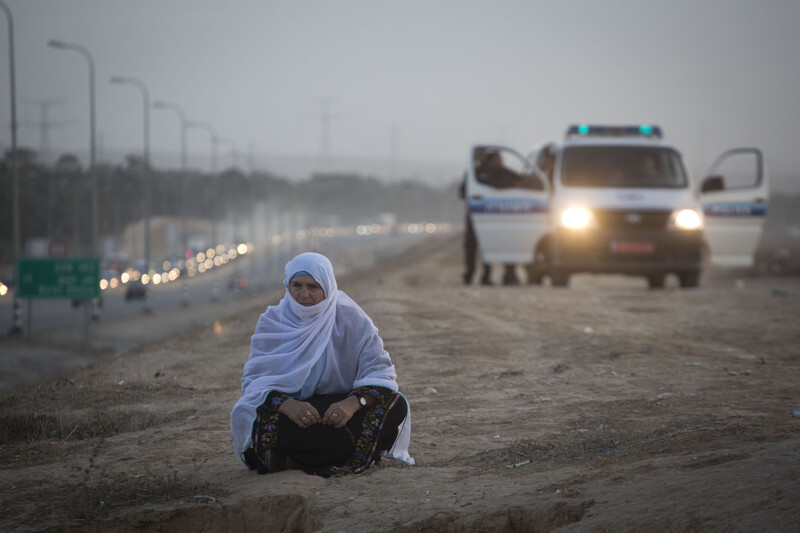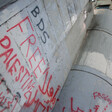The Electronic Intifada 21 December 2013

A Bedouin resident of the unrecognized village of al-Araqib sits during a protest against the demolition of her village and for the release arrested activists, 1 December 2013.
ActiveStillsSince the American Studies Association (ASA) announced this month that its members had voted overwhelmingly to endorse the boycott of Israeli academic institutions, the predictable outpouring of furious responses has been proliferating.
They range from former Harvard president Larry Summers’ recycling of the threadbare charge that the boycott is tantamount to anti-Semitism to the soundbites of homophobic, Islamophobic venom that have been spewed onto the ASA’s Facebook page and into the inboxes of its officers.
But surely the most disingenuous of responses to date is that of The Crisis of Zionism author and Open Zion editor Peter Beinart in The Daily Beast — despite the fact that Beinart eschews the overheated and overtly bigoted language deployed by other critics (“The real problem with the American Studies Association’s boycott of Israel,” 17 December 2013).
Indeed, Beinart generously exonerates the ASA from anti-Semitic tendencies, though the ASA has no need of his good graces on that score. It would have been better for Beinart to consider whether the really anti-Semitic gesture is not the Zionist demand that all Jews, no matter what their political or ethical beliefs, accept a single state as their representative and offer their allegiance to it, even if it is founded in discrimination, exclusion and ethnic cleansing.
To demand such an identification of all Jews is not only to dismiss the growing number of Jews worldwide who are challenging the nature of the “Jewish State,” but also to erase centuries of diverse and non-Zionist Jewish traditions.
Beinart also gives the ASA a pass on inconsistency, both for being an academic association boycotting academic institutions and for seeming to single out Israel for special attention. The ASA doubtlessly welcomes his dispensation, even though what it really reveals is his complete misunderstanding of the history and practice of boycott as a political tactic deployed by social movements.
“Orwellian”
But it is at the very heart of his column that Beinart reveals the peculiar and irresolvable contradictions that afflict the would-be liberal Zionist and the extraordinary contortions of truly Orwellian language that are required to magic those contradictions away.
How else, indeed, can one manage to normalize a state that has made itself an exception in every possible way while demanding to be viewed as the “only democracy in the Middle East?”
Beinart accuses the ASA and the Palestinian boycott movement as a whole of covertly “oppos[ing] the existence of a Jewish state within any borders.” They refuse, he complains, to distinguish between “the West Bank, where Palestinians lack citizenship, the right to vote and the right to due process, and Israel proper, where Palestinians, although discriminated against, enjoy all three.”
It’s a nice sleight of hand. Admitting that there is discrimination in Israel takes the reader’s eye off the real game, which is to pretend that that discrimination is an aberration, not the very essence of Israel’s basic laws and practices.
Shell game
Beinart cannot not know that Israeli law makes a distinction between holding formal citizenship (ezrahut) while while distributing the crucial category of nationality (le’um) on ethnic grounds, thus reserving for Jews the most substantial rights, including that of return and access to land.
This distinction was reaffirmed in October by Israel’s high court which threw out a petition by 21 citizens to have their nationality recorded in the population registry as “Israeli” rather than “Jewish.” The court ruled that removing this distinction would endanger Israel’s status as a “Jewish state” — that is to say one where Jews are privileged above non-Jewish citizens.
In this malicious shell game, Palestinians and other “non-Jews” face not only discrimination, but permanent exclusion from fundamental rights that in virtually every other state — and any claiming to be a “democracy” — are entailed upon citizenship.
Palestinians are not “immigrants”
Beinart also seeks to cover up another act of exclusion that is fundamental to Israel’s character as a racial state. This is his most fabulously Orwellian moment: “The BDS [boycott, divestment and sanctions] movement’s call for ‘respecting, protecting and promoting the rights of Palestinian refugees to return to their homes and properties’ denies Israel’s right to set its own immigration policy. So does the movement’s call for ‘recognizing the fundamental rights of the Arab-Palestinian citizens of Israel to full equality,’ which presumably denies Israel’s right to maintain the preferential immigration policy that makes it a refuge for Jews.”
“Preferential immigration policy” is the sanitary phrase with which Beinart describes the denial to refugees of the right, guaranteed under international law, to return to their homes. Palestinians in the diaspora who seek to return are not immigrants, but an indigenous people that has been ethnically cleansed from lands and communities where they have lived for generations.
They are the people who lived in the village of Issawiyeh, on whose expropriated land Hebrew University has built its Rabin Building, or who were deported from the destroyed village of Sheikh Muwanis, on which Tel Aviv University is located.
Or they are, like the great poet Mahmoud Darwish, the “present absentees;” people disappeared almost as much by the richly inventive language of Israeli discrimination that Beinart echoes as by the actual practices that turn an indigenous people into “immigrants” or “infiltrators.”
And that process of transfer is ongoing for the inhabitants of occupied East Jerusalem who, having been consistently denied permits to extend their houses under Israeli “law,” find their homes demolished or “legally” expropriated by settlers.
The exclusion is ongoing for any Palestinian “citizen” of Israel who, having married another Palestinian from a few miles away in the West Bank, is denied the right to family reunification and must self-transfer to other parts of the occupied territories.
Rights as “existential threat”
Is the Palestinian demand for Israel to “recogniz[e] the fundamental rights of the Arab-Palestinian citizens of Israel to full equality” so outlandish or outrageous?
In what other state would such a demand by any minority, indigenous or not, be seen as heralding the destruction of the state or as discriminating against the majority?
The examples that come to mind, inevitably, are apartheid South Africa, or Northern Ireland in the days when it was a “Protestant state for a Protestant people” and Catholics, who forged a civil rights movement to demand equal rights, were confronted with brutal state rejection and violence.
Such regimes, based fundamentally in discrimination or in the grossly unequal exercise of power or privilege, always regard any challenge to the system that maintains inequality as an existential threat.
The truth of Israel
In this respect, the occupied Palestinian territories are not to be distinguished from the “normal” or “proper” state of Israel. It is not only that, as Gideon Levy recently wrote in Haaretz, all Israeli institutions are complicit in the occupation. It is that the occupation and its practices are the truth of Israel itself.
The early Zionists, in their recognition of the existence of an indigenous Arab population that would not accept colonization and in their belief in the necessity of an “iron wall” of military force to realize their colonial projects, were not only prophetic. They were considerably more honest than current liberal Zionists about the nature of what they were doing.
“Two-state solution” threatens Palestinians
The increasingly remote possibility of the two-state solution, undermined by the daily expansion of illegal settlements, will not resolve the essentially discriminatory nature of an exclusive racial state. Perceived as a “demographic threat,” another Orwellian euphemism invoked to justify ethnic cleansing, it is Palestinians in Israel who face an existential threat in any two-state solution.
Such a “solution” would not — and should not — put an end, to the Palestinian pursuit of justice and equality. Under what dystopian code should any people abandon its rights or its pursuit of equal treatment under the law?
But this does not mean that the BDS movement intends the “destruction of the State of Israel,” with all the connotations of genocide or expulsion that that phrase, more or less openly invokes. It seeks its transformation.
An invitation
The BDS movement demands what Israel actually pretends to be: a normal democracy in a state of all its people. It does not ask anyone to leave or to accept less than equal rights. It asks only that Jews be willing to live on equal terms with non-Jews, with Palestinians or Bedouins, Christian, Muslim or secular, and to live in a land of all its people. That would be real belonging, not colonial settlement.
That is an invitation, not a threat. It is an invitation to Jews everywhere, and to all people, to realize the emancipatory potential embedded in every struggle for justice and in every act of local or international solidarity with those struggles.
It is an invitation to free oneself from the painful contradiction of advocating democracy and defending and supporting oppression. It is an invitation to step out of the meshes of a Zionist dream that has become a nightmare, ever more rigid and repressive, and to embrace the possibilities and the risks that true democracy and ethical decolonization entail.
Nelson Mandela’s death has brought to mind again the fact that for a peace process in South Africa to begin, white South Africans had, to their eventual credit, to stand down from their exclusionary racial privileges. In Northern Ireland too, Protestants had to relinquish their monopoly on rule in order for the peace process to begin.
Some have called these the costs of peacemaking. Perhaps it would be better to think of them as the gifts peace brings to those willing to contemplate cohabitation in a just society.
David Lloyd is Distinguished Professor of English at University of California, Riverside.





Comments
Excellent article...
Permalink Ben Alofs replied on
which goes to the heart of the matter and explains why the academics of the American Studies Association and other academics elsewhere in the world are voting in favour of boycotting Israeli academic institututions, which form the backbone of the (liberal) Zionist establishment.
Thank you, ASA!
"end Human bankruptcy"an idea
Permalink Richard C Brown replied on
"end Human bankruptcy"an idea whose time has come.
Beinart's head must be exploding~!
Permalink Pauline Park replied on
I was unaware of the distinction made between 'citizenship' and 'nationality' in Israeli law. Prof. Lloyd's brilliant analysis of liberal Zionism exposes and explodes its absurd contradictions and makes a real contribution to our understanding of the fundamental problem with the Israeli state.
David Lloyd's article
Permalink Rada replied on
This is an excellent article making clear why liberal Zionism is failing to 'sell' Israeli regime of apartheid and occupation, in the ’48 and occupied West Bank, as an acceptable democratic model.